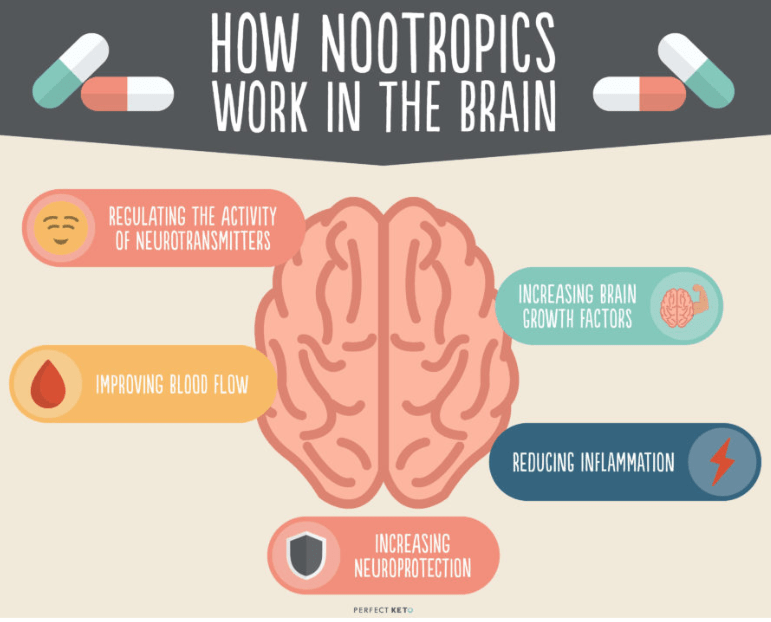In the fast-paced world we live in, cognitive enhancement has become a popular topic of discussion. People are constantly seeking ways to boost their mental clarity, focus, and overall brain function. This has led to the rise in popularity of nootropics, often referred to as “smart drugs.” But amidst the sea of information and products available, the question arises: which nootropics actually work? In this article, we’ll dive into the world of nootropics, exploring what they are, how they work, and which ones have scientific backing to deliver on their promises.
Table of Contents
- Introduction
- Understanding Nootropics
- The Science Behind Nootropics
- Nootropics with Scientific Support
- Caffeine and L-Theanine
- Bacopa Monnieri
- Rhodiola Rosea
- Lion’s Mane Mushroom
- Modafinil
- Placebo Effect and Nootropics
- Balancing Risks and Benefits
- Natural vs. Synthetic Nootropics
- Personalized Cognitive Enhancement
- Dosage and Timing Considerations
- Healthy Lifestyle and Cognitive Function
- Common Myths about Nootropics
- Consulting a Healthcare Professional
- Conclusion
Introduction
In our quest to become more productive and efficient, many of us have turned to nootropics, hoping to find the key to unlocking our cognitive potential. But with the sheer number of products flooding the market, it’s crucial to separate the legitimate options from the empty promises.
Understanding Nootropics
Nootropics, often called cognitive enhancers or smart drugs, encompass a wide range of substances that claim to improve cognitive functions such as memory, creativity, and motivation. These substances can vary greatly in their mechanisms of action and potential benefits.
The Science Behind Nootropics
Nootropics operate on complex neural pathways, influencing neurotransmitter levels, cerebral blood flow, and brain waves. However, not all nootropics are created equal. Some have undergone rigorous scientific testing, while others lack substantial evidence to support their claims.
Nootropics with Scientific Support
Caffeine and L-Theanine
One of the most well-known and studied combinations, caffeine and L-Theanine, found naturally in tea leaves, work together to enhance alertness and attention without the jitters often associated with caffeine consumption alone.
Bacopa Monnieri
Used in traditional medicine for centuries, Bacopa Monnieri has shown promise in improving memory and reducing anxiety through its adaptogenic properties.
Rhodiola Rosea
This adaptogenic herb may help combat mental fatigue and enhance overall cognitive function, particularly during periods of stress.
Lion’s Mane Mushroom
With its potential to stimulate nerve growth factor production, Lion’s Mane mushroom holds the potential to support brain health and cognitive function mentalitch.com.
Modafinil
Prescription-based Modafinil has gained attention for its ability to promote wakefulness and improve cognitive performance, especially in individuals with sleep disorders.
Placebo Effect and Nootropics
The placebo effect can play a significant role in the perceived effectiveness of nootropics. The power of belief and expectation can lead to temporary cognitive improvements, even if the substance itself lacks scientific validation.
Balancing Risks and Benefits
As with any supplementation, it’s important to consider potential risks and side effects. While many nootropics are generally considered safe, individual reactions can vary.
Natural vs. Synthetic Nootropics
The debate between natural and synthetic nootropics revolves around purity, potency, and potential side effects. Natural options often come with a gentler profile, while synthetic compounds might offer more potent effects.
Personalized Cognitive Enhancement
Every individual’s brain chemistry is unique, meaning that what works for one person may not work for another. Personalized experimentation is key to finding the right nootropic regimen.
Dosage and Timing Considerations
Finding the right dosage and timing is crucial. Some nootropics may have a cumulative effect and require consistent use over time, while others offer more immediate benefits.
Healthy Lifestyle and Cognitive Function
Nootropics are most effective when coupled with a healthy lifestyle. Regular exercise, a balanced diet, quality sleep, and stress management all contribute to optimal cognitive function.
Common Myths about Nootropics
Dispelling myths is essential in this space. Not all nootropics will turn you into an overnight genius, and responsible use is vital for long-term benefits.
Consulting a Healthcare Professional
Before incorporating nootropics into your routine, it’s wise to consult a healthcare professional. They can provide personalized guidance based on your medical history and individual needs.


